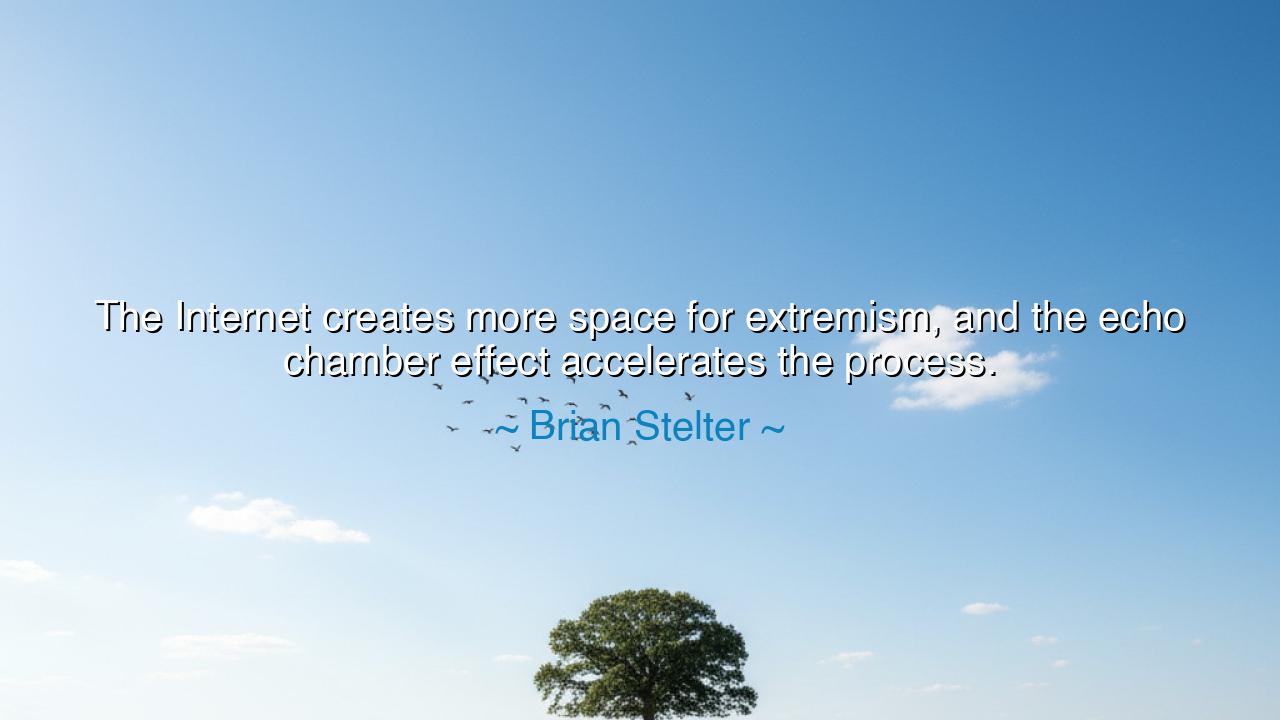
The Internet creates more space for extremism, and the echo
The Internet creates more space for extremism, and the echo chamber effect accelerates the process.






Come, O children of the future, and heed the words of Brian Stelter, for they carry a deep truth about the world we now inhabit. He said, "The Internet creates more space for extremism, and the echo chamber effect accelerates the process." In these words, Stelter speaks to a growing concern that stretches far beyond the technology of the Internet itself. He speaks of the power that the vast network of connectivity has to shape minds and hearts, drawing them into narrow, often dangerous ideologies, where the voices of extremism are not only heard, but amplified.
Consider, O children, the rise of the ancient city-states, where the flow of knowledge was tightly controlled, where the teachings of the philosophers were passed down in the public square, carefully curated for the benefit of all. But just as some minds were illuminated by the wisdom shared in these places, so too were others led astray. Socrates warned us of the power of unchecked persuasion, that rhetoric could be used to influence the masses, drawing them into ideas that served no greater good. The Internet, as Stelter suggests, is the modern equivalent of the public square, but its reach is vast, its influence undeniable. Today, ideas—whether good or evil—are not limited by geography or society’s norms; they can spread across the globe in an instant, gaining followers, and in some cases, followers who are trapped in echo chambers of their own making.
The echo chamber effect, as Stelter so rightly names it, is the acceleration of this process. When we surround ourselves only with voices that mirror our own beliefs, we begin to reinforce those beliefs without challenge or reflection. Think of the ancient echoes in the mountains, where the sound of a single voice was reflected and multiplied, but never allowed to dissipate. So too are the voices of extremism echoed across the Internet, where algorithms amplify and feed back the same ideas again and again, creating a feedback loop that distorts our understanding of the world and entrenches us in our own biases. What was once a whisper can become a roar, and before long, we are no longer listening to a conversation, but to a single, unyielding truth that we alone perceive.
Look, O children, to the story of the Reformation. In the early days, when Martin Luther posted his 95 Theses, it was the spread of ideas—quickly passed from person to person—that sparked a revolution. Luther’s words were not the only ones that spread in that time, but they were the right ones, speaking to the needs of the people and challenging the power structures of the Church. But in our modern world, Stelter warns us, that same spread of ideas can be dangerous. Ideas that once were questioned, challenged, and scrutinized in the public discourse are now amplified in spaces where they can grow without restraint. The same Reformation spirit that once led to positive change can now lead to the rise of divisive ideologies, making it all the more difficult to discern truth from falsehood.
The lesson of Stelter’s words is one of deep responsibility. In a world of such unrestricted access, we must remain ever vigilant. It is not enough to simply have the freedom to speak and share ideas; we must also recognize the responsibility that comes with this power. Just as Plato’s Allegory of the Cave taught that we must not be content to sit in the darkness, seeing only shadows of truth, so too must we step out of our own echo chambers, and seek the fullness of truth. We must question the ideas that are presented to us, challenge those that are repeated without thought, and strive for the light of understanding that comes from diverse perspectives.
So, O children, what can you take from Stelter’s words? The Internet is a tool, but like all tools, it can be used for good or evil. You must be aware of the echo chambers that surround you, aware of the ways in which your mind can be shaped by the voices you allow in. Seek the truth not in the spaces that tell you what you want to hear, but in the places that challenge you to think, to question, and to grow. Understand that extremism often grows in spaces where critical thinking is absent and the discourse is dominated by the loudest, most polarizing voices. Break free from these cycles, and cultivate spaces of inclusivity, where all voices are heard, and all ideas are given their due consideration.
Rise, O children, and be the guardians of your own minds. In this world of endless information, be not swayed by the echo chambers that seek to define your truth. Instead, seek to expand your understanding, to welcome the diverse voices that will challenge you to become wiser, more thoughtful, and more compassionate. For only then will you be able to see clearly, to distinguish between the truth and the falsehoods that will inevitably come in the wake of unchecked power. Let the Internet be a tool for enlightenment, not for division, and let your hearts remain open to the world as it truly is, not as a shadow reflected in the walls of your own echo chamber.






AAdministratorAdministrator
Welcome, honored guests. Please leave a comment, we will respond soon